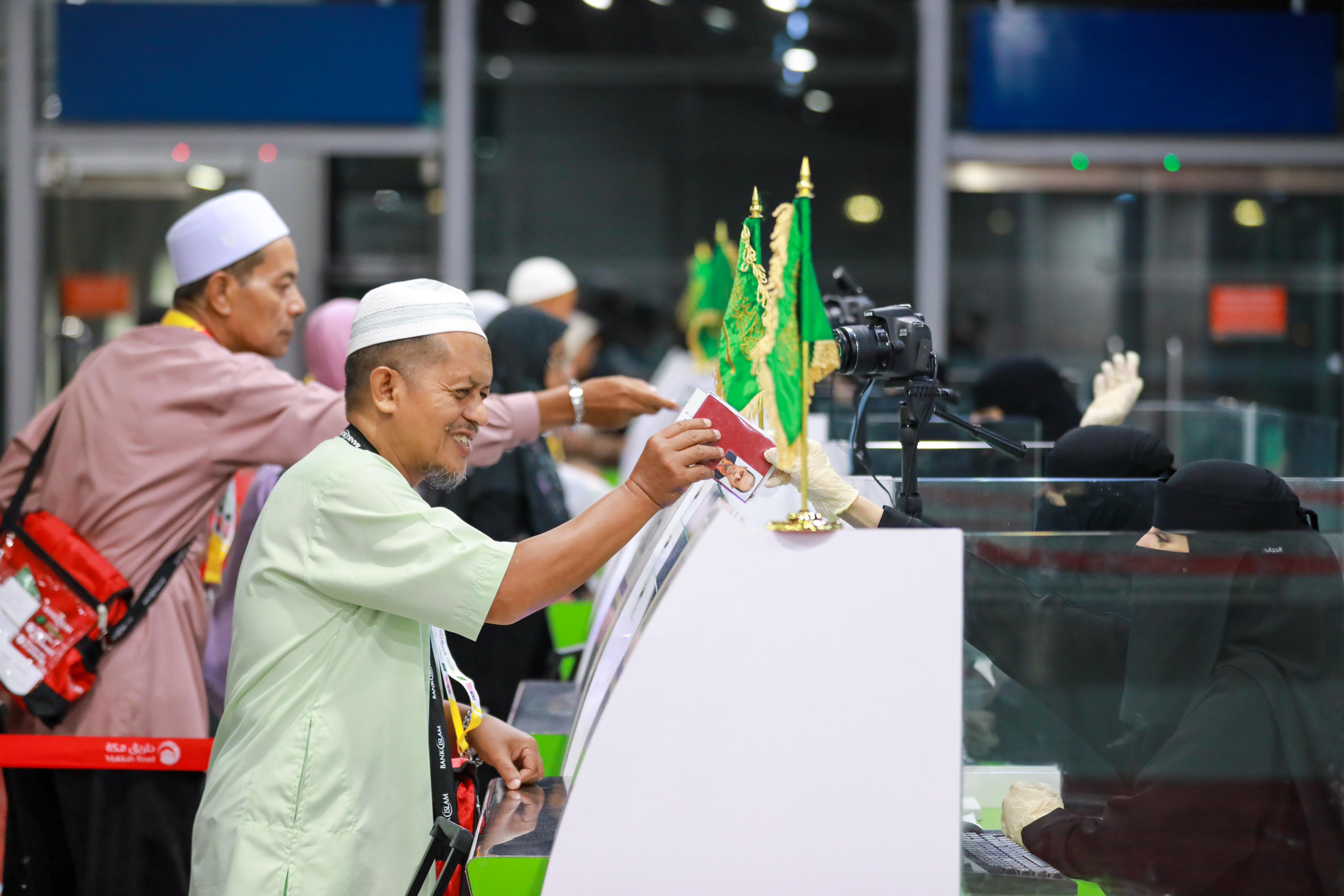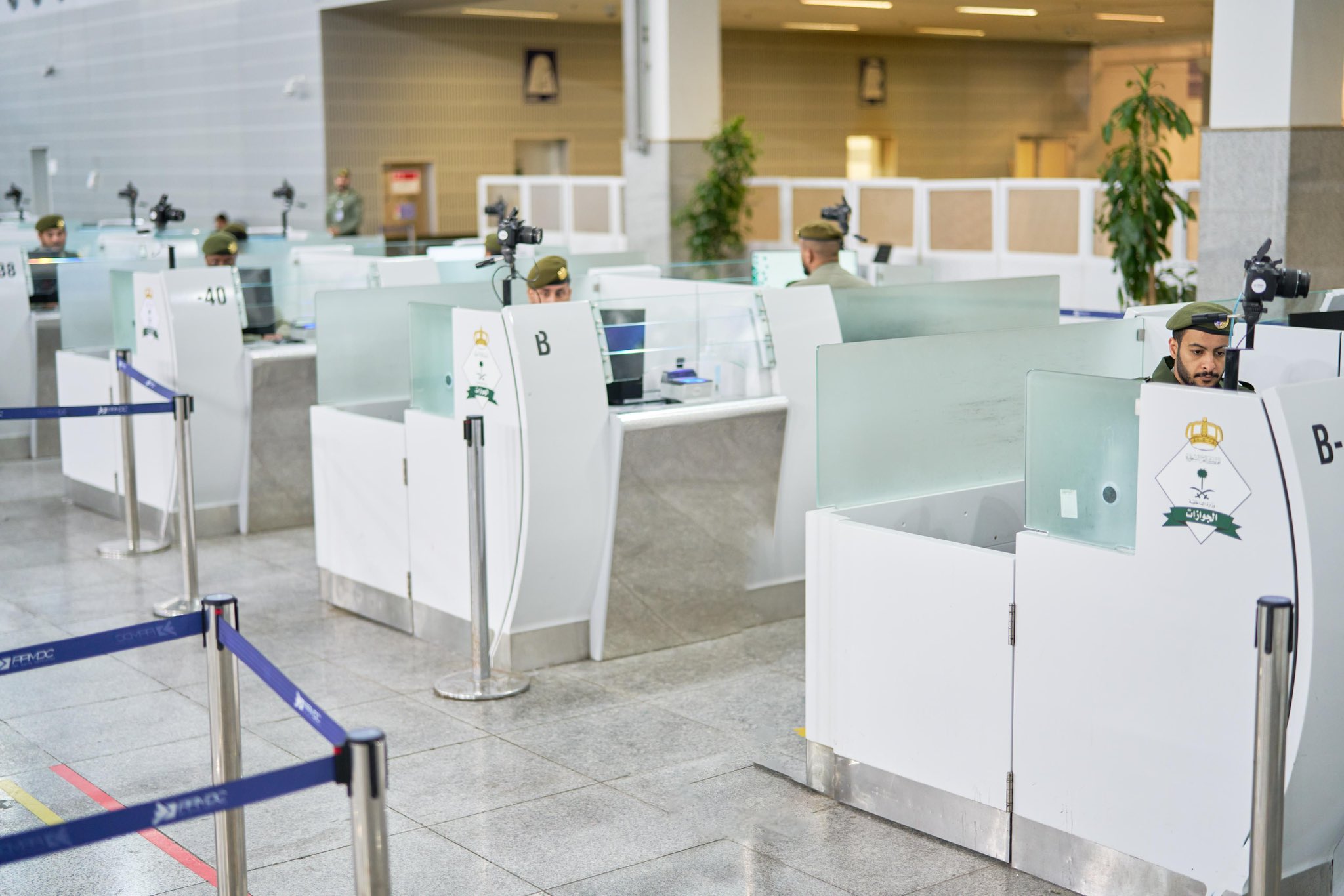Saudi Visas
Saudi Visas are permits for entering or exiting the territory of the Kingdom of Saudi Arabia. Citizens of sixty-six countries are eligible to obtain an electronic visa to enter Saudi Arabia.
Unified National Platform for Visas
Several entities are responsible for issuing and extending Saudi visas, including the Ministry of Foreign Affairs and the General Directorate of Passports. On May 17, 2022, the Council of Ministers approved the Unified National Platform for Visas to handle all visa issuance processes. This platform links the applicant's information with several competent government entities to verify and approve the services provided.
The Unified National Platform for Visas is affiliated with the Ministry of Foreign Affairs and enables beneficiaries to access various ministry services, such as issuing visas, registering authorizations, and inquiring about previously submitted applications.
The platform offers several services, including visa services for citizens and residents in Saudi Arabia, as well as for businesses and entities. Through the platform, citizens and residents can apply for family visit visas, personal visit visas, extend return visas, authorize visas, authorize work visas (Musaned), authenticate requests for individuals, and access inquiry and suggestion services.
KSA Visa
On December 19, 2023, the "KSA VISA" platform was launched as part of the activities of the second edition of the Digital Government Forum. The platform aims to connect approximately thirty ministries, authorities, and private sector entities to streamline visa procedures and achieve Saudi Arabia's goals, including Hajj visas, Umrah visit visas, business visit visas, tourism visit visas, and work visas.
The platform includes several procedures: automating essential visa issuance procedures to enhance the visitor experience, providing a smart search engine for easy access to available visas, and incorporating a unified reference to outline the requirements and application processes for all visa types. It also offers an updated personal file for visitors to view and reapply for visas conveniently, and introduces a modern identity aligned with the platform's national role in supporting Saudi Arabia's objectives. Additionally, the platform has integrated artificial intelligence and emerging technologies to verify data accuracy and improve efficiency.
Saudi e-Visa
Citizens of sixty-six countries are eligible to obtain an electronic visa to enter Saudi Arabia. The list includes European countries: Albania, Andorra, Austria, Belgium, Bulgaria, Croatia, Cyprus, Czech Republic, Denmark, Estonia, Finland, France, Georgia, Germany, Greece, Netherlands, Hungary, Iceland, Ireland, Italy, Latvia, Liechtenstein, Lithuania, Luxembourg, Malta, Monaco, Montenegro, Norway, Poland, Portugal, Romania, Russia, San Marino, Slovakia, Slovenia, Spain, Sweden, Switzerland, Ukraine, and United Kingdom; Asian countries: Azerbaijan, Brunei, China (including Hong Kong and Macau), Japan, Kazakhstan, Kyrgyzstan, Malaysia, Maldives, Singapore, South Korea, Tajikistan, Thailand, Turkey, Uzbekistan; North American countries: the United States, Canada, The Bahamas, Barbados, Saint Kitts and Nevis, Panama, and Grenada; African countries: Mauritius, Seychelles, South Africa, and Oceania countries: Australia and New Zealand.
Airlines are responsible for verifying the validity of visas before tourists board flights heading to Saudi Arabia.
How to apply for Saudi visas
Visas can be obtained through Saudi Arabia's representations in foreign countries, electronically through the Ministry of Foreign Affairs website, at airports (visa on arrival), or electronically via the Unified National Platform for Visas. The locations and procedures for issuing visas vary depending on their type and purpose.
Saudi visa fees
The fees for Saudi visas vary. For example, tourists coming to Saudi Arabia bear fees of SAR300 (USD80), while a fee of SAR300 is charged for transit visas, in addition to SAR50 for leaving Saudi Arabia through seaports. However, the Saudi government covers the visa fees for Hajj and Umrah, which amount to around SAR2,000 for first-time Hajj pilgrims and Umrah performers, considering them as "guests of the Merciful".
Requirements after obtaining an entry visa
Saudi visas require foreign visitors and residents to comply with Saudi laws and regulations while they are on the territory of Saudi Arabia. This includes adherence to customs requirements, passport and immigration regulations, and other internal policies.
Citizens of Gulf Cooperation Council (GCC) countries (Saudi Arabia, United Arab Emirates, Bahrain, Qatar, Oman, and Kuwait) are exempt from visas when traveling within the GCC countries. They can use their national ID cards instead of passports for identification.
Types of Saudi visas
Types of Saudi visas vary according to the purpose of travel, including: Umrah visa, Hajj visa, tourism visa, work visa, multiple entry visa, family visit visa, business visit visa, commercial visit visa, residence visa, transit visa, companion visit visa, government visit visa, cargo delivery visa, personal visit visa, mission visit visa, student visa, diplomatic visa, special visa, businessmen visit visa, medical treatment visit visa, and visitor investor visa.
Saudi tourist visa
It is an entry visa to Saudi Arabia, designated for tourists from around the world. It was launched by Saudi Arabia on September 27, 2019, and allows tourists to stay for a maximum period of ninety days. Starting from September 27, 2019, it became possible for foreign visitors to obtain tourist visas that allow them to stay and move around Saudi Arabia for up to ninety days.
After the launch of Saudi Vision 2030, which focuses on diversifying the economy and reducing reliance on oil, Saudi Arabia introduced several initiatives in 2019, including the tourist visa. It set a strategic goal to reach one hundred million annual visitors by 2030.
During the first thirty-three days after the launch of the tourist visa, Saudi Arabia received 77,069 tourists, with Chinese tourists being the most numerous during that period, followed by British and American tourists.

Types of Saudi tourist visa
The tourist visa has two types: a single-entry visa valid for three months with a stay duration of ninety days, and a multiple-entry visa valid for one year with a stay duration of three months. The law allows citizens of the United States to extend the validity of their visa for six months after the expiration date of their passports.
Applicants for the tourist visa must be at least eighteen years old unless accompanied by a guardian. Their passport must be valid for at least six months from the date of entry into Saudi Arabia. Additionally, there is no requirement for a sponsor, and no religious requirement to obtain the visa.
Obtaining a tourist visa requires several documents, including proof of accommodation, return ticket, employment verification, bank statement, as well as identification, residence address, and itinerary.
Saudi tourist visa fees
The visa fee is SAR300 (approximately USD80), inclusive of medical insurance, excluding the value-added tax (VAT). These fees are non-refundable in case the visa application is rejected. Additionally, there are extra accommodation fees if the tourist stays beyond the specified duration, amounting to SAR100 for each additional day.
Tourists can obtain the tourist visa through three methods: electronically (e-Visa) via the e-Visa portal a method designated for tourists from sixty-six specified countries, which takes five to thirty minutes to process. The second method is upon arrival through six entry points, designated for tourists from the specified sixty-six countries, holders of valid US or UK visas, or Schengen visas, provided that the visas are valid, are for tourism or business purposes, and have been previously used, carries the issuing country's stamp, and the travel is with Saudia or any other Saudi airline. The third method is through Saudi embassies and consulates abroad, a method available to tourists from all countries.
Tourists who obtain entry visas are able to explore the tourist landmarks of Saudi Arabia and engage in tourist activities available within the country. These include regions and tourist attractions such as Jeddah, Tabuk, al-Ahsa, Abha, ad-Dir'iyyah, Riyadh, NEOM, Wadi ad-Disah, al-Ula, and exploring ancient life up close at Aljhali Museum, visiting the Rose Garden, learning horseback riding from beginner to professional level, practicing diving on the beaches of Jeddah, and engaging in meditation breathing sessions.
The tourist visa does not entitle its holder to perform the Hajj rites, as Saudi laws prohibit those on a tourist visa from performing the Hajj pilgrimage while in Saudi Arabia. Additionally, Saudi laws also prevent them from performing Umrah during the Hajj season as determined by the Ministry of Hajj and Umrah.

Hajj Visa
Saudi Arabia provides a visa of a religious nature specifically for Muslims, which is issued to pilgrims wishing to enter the Kingdom to perform the fifth pillar of Islam.
It is an electronic service provided by the government of Saudi Arabia for pilgrims coming from outside the Kingdom. The service involves simplified procedures carried out by the Ministry of Hajj and Umrah and the Ministry of Foreign Affairs, replacing the traditional paper visa with a modern electronic one. This aligns with the objectives of speed, efficiency, and the goals of Saudi Vision 2030.
The “Maqam” central reservation system is a tool for integration among the Ministry of Hajj and Umrah, the Ministry of Foreign Affairs, and the National Information Center. It is designed to issue electronic visas for pilgrims who have completed their contractual procedures digitally, eliminating the need to visit Saudi embassies abroad. It enables the digital issuance of visas to reduce time and effort.
Through advanced technologies linking the Diwan of the Ministry of Foreign Affairs with the official and temporary Hajj affairs offices, Hajj visas are issued electronically in record time via embassies, consulates, and supporting missions facilitating the visa granting processes in various countries around the world.
The Pilgrim Experience Program, in cooperation with the relevant entities organizing Hajj and Umrah, works on launching the electronic visa from all countries from which the pilgrims come to Saudi Arabia, whether during the Hajj season or for Umrah and visitation. This visa simplifies the journey of the Hajj pilgrim and Umrah performers in their procedures for visiting the holy sites in Makkah al-Mukarramah and al-Madinah al-Munawwarah.
The Ministry of Foreign Affairs has dedicated a digital portal on its website for applying for electronic Hajj and Umrah visas. Through this portal, Hajj pilgrims and Umrah performers can issue their visas after filling in the required data and completing the procedures related to the Ministry of Hajj and Umrah, to facilitate the visa steps and streamline its stages.

Umrah visa
The Ministry of Hajj and Umrah has developed electronic platforms in cooperation with other entities, as part of efforts to facilitate the arrival of Umrah performers to Saudi Arabia. These platforms allow Umrah performers and visitors from abroad to apply and learn about the methods of obtaining an Umrah visa, including the ability to purchase a service package and make payments electronically. Applicants can submit their requests, including the data required by the Ministry of Foreign Affairs form, and specify their Umrah itinerary through one of the approved electronic platforms.
The Nusuk application allows booking appointments for performing Umrah and visiting the Noble Prophet's Mosque after international Umrah performers have obtained their visa, through facilitated electronic procedures available around the clock.

Medical treatment visa
The visa for entry into Saudi Arabia for treatment, a service provided by the Ministry of Foreign Affairs of the Kingdom, allows applicants seeking medical treatment from outside the Kingdom to apply for a visit visa for medical treatment purposes.
Work visa
The Ministry of Human Resources and Social Development in Saudi Arabia provides a work visa service for enterprises applying for foreign recruitment for the first time after their founding, for those looking to expand their operations, and for those associated with a government contract or possessing specific government approval.
Personal visit visas
Personal visit visas are among the electronic services provided by the Ministry of Foreign Affairs in Saudi Arabia. This service allows individuals who do not have commercial or family status to request a visit visa.
Family visit visas
The Ministry of Foreign Affairs in Saudi Arabia provides a service for family visit visas, an electronic service enabling applicants to request visits for first-degree relatives of citizens and residents (parents, spouses, and children).
Work visa for organizations and representations
The Ministry of Foreign Affairs in the Kingdom offers a work visa service for organizations and attaches. This is an electronic service that enables consulates and service offices to enter and process the data of work visa applicants, verify their authenticity from various countries around the world, and link them with internal entities in Saudi Arabia.
Exit visa for diplomats and special passport holders
The exit visa for holders of diplomatic and special passports is an electronic service provided by the Ministry of Foreign Affairs. This service enables the issuance of exit visas of single or multiple exit visas for Saudi diplomatic and special passport holders for a specified duration.
Transit visa
The transit visa is an electronic service provided by the Ministry of Foreign Affairs. Applicants for transit visas can enter their information through the electronic portal to obtain a Saudi transit visa. The transit visa is available to applicants of any nationality using the Enjaz e-Visa services platform. The transit visa allows individuals to pass through Saudi Arabia. Additionally, it permits a short-term stay of up to twelve hours. Transit visas are available for durations of forty-eight hours and ninety-six hours.

Work visit visas
The Ministry of Foreign Affairs provides a work visa service, which is an electronic service available through the ministry's electronic visa services website. Applicants can request approval for two categories of visits to Saudi Arabia. The first category covers (individual) visits, encompassing all visa services and targeting individuals residing abroad who are looking to work in Saudi Arabia. The second category, known as visits (for sectors and organizations), covers visa applications focusing on entry services related to agents and companies accredited by Saudi missions abroad.
Cargo delivery visas
The cargo delivery visas are an electronic service offered by the Ministry of Foreign Affairs in Saudi Arabia. Through this service, beneficiaries can apply for an entry visa to Saudi Arabia for the purpose of delivering goods.
Residence visas
Residence visas are among the services provided by the Ministry of Foreign Affairs. Through this service, beneficiaries can apply for an entry visa to Saudi Arabia for their accompanying individuals.
Business visit visas
The Ministry of Foreign Affairs offers a visa service for business visits, an electronic service that enables companies or institutions within Saudi Arabia to request a visit for one or more individuals based on specific professional criteria who have business relations with the inviting company.
Student visa
A request for a student visa is an electronic service provided by the Ministry of Foreign Affairs in Saudi Arabia for educational institutions within the Kingdom to request an individual from abroad to study at the educational institution.
Visitor investor visa
In November 2023, the Ministry of Investment and the Ministry of Foreign Affairs launched the business visit e-visa "visitor investor." This visa aims to provide foreign investors and employees of foreign entities the opportunity to apply for an electronic visit visa through the Ministry of Investment's platform "Invest Saudi," allowing the request to be processed and the visa issued digitally via the Unified National Platform for Visas without the need to visit Saudi representations abroad for biometric data. The visa can be used for up to one year with multiple entries, and several beneficiaries can obtain the visa immediately for the purpose of visiting Saudi Arabia and exploring investment opportunities.